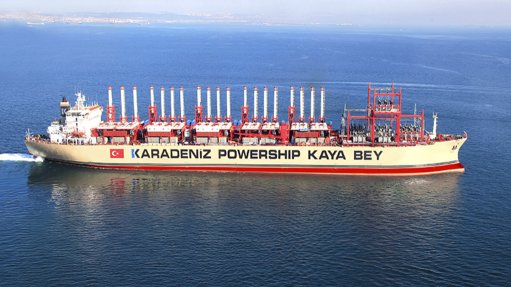
Civil society organisation the Organisation Undoing Tax Abuse (Outa) has filed a review application in the North Gauteng High Court to have the decision by the National Energy Regulator of South Africa (Nersa) to grant floating gas powership company Karpowership-linked independent power producers (IPPs) generation licences set aside.
Outa’s Advocate Stefanie Fick told media during an April 28 briefing that the application sought for the granting of the licences to be reviewed and set aside, as well as a court order for Nersa to reconsider and review the applications.
Nersa stated in a media release that it had yet to receive the court application.
It added that, once it received the application, it would study it and advise whether it would oppose the application.
Meanwhile, Outa’s affidavit states that Nersa’s decision-making was procedurally unfair. “The process was premature and lacking in transparency, with significant portions of the licence application redacted,” Outa said.
Outa CEO Wayne Duvanhage said the regulator did not have the necessary information on issues such as port authorisations, environmental authorisations, a range of gas pipeline and storage licences to reach a correct decision, and neither did the public as the process proceeded.
“All the necessary facts and information were not available to the public and, therefore, prevented the public from participating effectively,” he said.
Fick added that Nersa’s lack of transparency on the financial information raised concern about the effect on the public.
“It failed to deal with the issue of price variation in circumstances where prices over the next 20 years will be dependent on the dollar price. This causes uncertainty and may come at tremendous cost to the South African public,” she argued.
“Outa is calling for the licensing decisions to be overturned, as we believe Nersa did not act in the interests of South Africa in granting these,” she noted.
Nersa also failed to take value-for-money considerations into account, including consideration of more cost-effective options, Outa’s affidavit said.
“There are faster and substantially cheaper generation project options available to eliminate load-shedding in the short term, so the Karpowership projects are not needed,” Fick said.
Outa believes high-capacity-factor gas power, as proposed by Karpowership, will mostly not displace carbon dioxide-emitting coal-fired power generation as claimed by Nersa in its reasons for its decision, but will rather displace the amount of future renewable energy that will be built.
“Nersa failed to consider the climate impact of 20-year generation licences for the Karpowership IPPs, which run on fossil fuels, when cleaner, cheaper and faster electricity supply options are available.
“It will thus result in a higher emitting power sector than what would otherwise have been the case, and undermine the country’s efforts to decarbonise its economy,” said Fick.
Further, Outa stated that the Karpowership projects would impose unnecessary financial, economic and environmental costs on South Africa and that the 20-year contracts carry a “significantly greater risk” to customers, the public and the economy than the available alternatives.
“Nersa has failed to conduct a proper analysis of the project costs and cost risk, and appears to have misconstrued the issues surrounding the electricity pricing formulas, in particular the gas pricing components. “This includes the price being significantly exposed to variations in the US dollar to rand exchange rate and global gas prices,” Fick said.
The Karpowership bid price in April 2020 was about R1.50/kWh, and Nersa said this would have increased to R2.80/kWh from April 2022.
However, an independent consultant estimates the current price is close to R5/kWh, which is about two to three times the cost of alternative generation methods, Outa stated.
“The pricing methodology is such that the Karpowership IPPs could receive ‘windfall’ profits,” Fick said.
“Nersa appeared to prioritise the interests of the Karpowership IPPs over the public. It is of great concern that Nersa, a South African public body using public funding, expresses concern about the financial affairs of a private Turkish majority-owned company, thereby creating the distinct impression that the financial well-being of Karpowership should enjoy preference above that of the South African public,” added Fick.